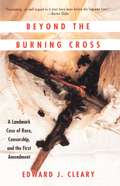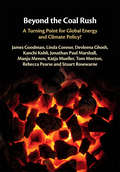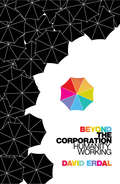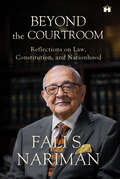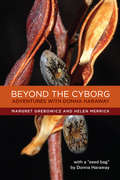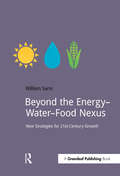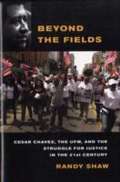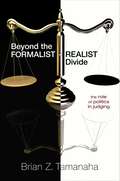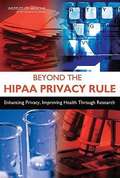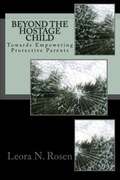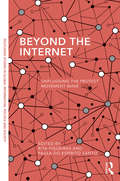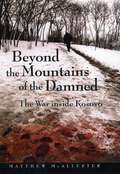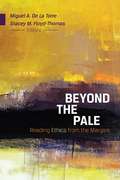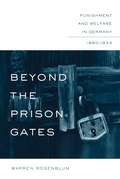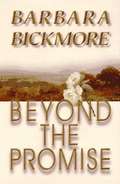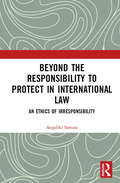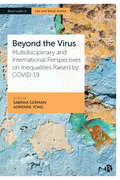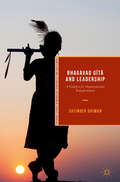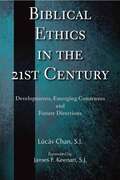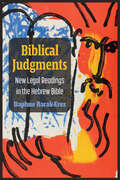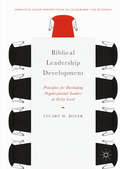- Table View
- List View
Beyond the Burning Cross: A Landmark Case of Race, Censorship, and the First Amendment
by Edward J. ClearyHere is the story of the controversial landmark decision by the lawyer who took the case all the way to the Supreme Court. Although he detested the crime his client had committed in 1990, Cleary believed First Amendment rights were being threatened. The Supreme Court agreed.
Beyond the Coal Rush: A Turning Point for Global Energy and Climate Policy?
by James Goodman Tom Morton Rebecca Pearse Jonathan Paul Marshall Stuart Rosewarne Devleena Ghosh Linda Connor Kanchi Kohli Manju Menon Katja MuellerClimate change makes fossil fuels unburnable, yet global coal production has almost doubled over the last 20 years. This book explores how the world can stop mining coal - the most prolific source of greenhouse gas emissions. It documents efforts at halting coal production, focusing specifically on how campaigners are trying to stop coal mining in India, Germany, and Australia. Through in-depth comparative ethnography, it shows how local people are fighting to save their homes, livelihoods, and environments, creating new constituencies and alliances for the transition from fossil fuels. The book relates these struggles to conflicts between global climate policy and the national coal-industrial complex. With coal's meaning transformed from an important asset to a threat, and the coal industry declining, it charts reasons for continuing coal dependence, and how this can be overcome. It will provide a source of inspiration for energy transition for researchers in environment, sustainability, and politics, as well as policymakers.
Beyond the Corporation: Humanity Working
by David Erdal* Beyond the Corporation is a book for our times. Offering inspiration and vision in the wake of financial Armageddon, it is the story of ordinary people who share the ownership of the businesses where they work.* The enterprises come in all sizes: from companies employing just a few dozen people, to large corporations: John Lewis in the UK, employing 70,000 'partners'; Mondragon, a highly entrepreneurial group of over 100 businesses in Spain, employing more than 100,000; and many examples in the US, some employing tens of thousands. It would be hard to imagine a better informed, more involved or more enthusiastic set of employees - sharing the efforts of making their companies successful, and sharing all of the rewards. Unusually in the corporate world, they control their own destinies - a situation beyond the dreams of most working people.* Erdal takes a hard look at those who insist, in the teeth of the evidence, that shared ownership will never work - a sorry tale, he argues, of prejudice masquerading as economic thinking. The book contains detailed case studies as well as interviews with a range of people, whose inspiring stories of success fly in the face of received wisdom. These successes include: high levels of productivity; sustained rapid growth; fast-moving, innovative responses to changing worlds; high levels of investment aimed at long-term prosperity; and, above all, the sheer happiness employees experience in working together in businesses that they own together, sharing the wealth that they create. * At a time when the 'orthodox' corporate economy has been badly shaken, Beyond the Corporation makes essential reading.
Beyond the Courtroom
by Fali S. NarimanDiscover the profound contributions of Fali S. Nariman, a towering figure in Indian jurisprudence, through this authoritative anthology that encapsulates his lifelong dedication to law and justice. Beyond the Courtroom presents a meticulously curated selection of his most influential speeches, groundbreaking articles, and illuminating lectures, showcasing the vast breadth and depth of his legal and constitutional expertise.This collection spans the entirety of Nariman&’s distinguished career, offering incisive analyses of national issues, legal reforms, and critical reflections on arbitration, judiciary, and constitutional law. Each section highlights a unique facet of Nariman&’s intellectual rigour and legal acumen, providing readers with a comprehensive understanding of his perspectives on justice, governance, and the rule of law.With contributions that have shaped legal discourse and inspired countless professionals, this volume is an essential resource for legal scholars, practitioners, and anyone interested in the foundational principles of law, justice, and constitutional governance. Beyond the Courtroom stands as a testament to the enduring legacy of one of India&’s most esteemed legal minds.
Beyond the Cyborg: Adventures with Donna Haraway
by Margret Grebowicz Helen MerrickFeminist theorist and philosopher Donna Haraway has substantially impacted thought on science, cyberculture, the environment, animals, and social relations. This long-overdue volume explores her influence on feminist theory and philosophy, paying particular attention to her more recent work on companion species, rather than her "Manifesto for Cyborgs."Margret Grebowicz and Helen Merrick argue that the ongoing fascination with, and re-production of, the cyborg has overshadowed Haraway's extensive body of work in ways that run counter to her own transdisciplinary practices. Sparked by their own personal "adventures" with Haraway's work, the authors offer readings of her texts framed by a series of theoretical and political perspectives: feminist materialism, standpoint epistemology, radical democratic theory, queer theory, and even science fiction. They situate Haraway's critical storytelling and "risky reading" practices as forms of feminist methodology and recognize her passionate engagement with "naturecultures" as the theoretical core driving her work. Chapters situate Haraway as critic, theorist, biologist, feminist, historian, and humorist, exploring the full range of her identities and reflecting her commitment to embodying all of these modes simultaneously.
Beyond the Energy–Water–Food Nexus: New Strategies for 21st-Century Growth (Doshorts Ser.)
by Will SarniProviding food, clean water and energy for a growing population is one of the greatest challenges facing public and private sector professionals. While there is widespread recognition of the complex feedback loops between energy, water and food, there has been less focus on viable solutions. This guide by Will Sarni – an internationally recognized thought leader on corporate water stewardship and water tech innovation – frames the key issues and challenges for business professionals, and then outlines emerging solutions which include both "soft path" and technology innovation approaches. The book includes case examples of multinational companies who are abandoning business as usual and moving beyond traditional thinking. It also highlights crucial new partnerships or "collective action initiatives" where NGOs, multinationals and the public sector come together to forge practical solutions to meet the needs of their stakeholders. Solutions to the energy–water–food nexus will need to be disruptive, not incremental, and will require technology innovation, new public–private partnerships, and changes in public policy. Beyond the Energy–Food–Water Nexus shows organizations how they can play their part in improving the quality of life for an urbanized global population while preserving the ecosystems that sustain us all.
Beyond the Fields: Cesar Chavez, The UFW, and the Struggle for Justice in the 21st Century
by Randy ShawShaw reveals the untold story behind "si se puede," which is still setting the course for today's progressive movements, by tracing the legacy of Chavez and the United Farm Workers of America (UFW).
Beyond the Formalist-Realist Divide: The Role of Politics in Judging
by Brian Z. TamanahaAccording to conventional wisdom in American legal culture, the 1870s to 1920s was the age of legal formalism, when judges believed that the law was autonomous and logically ordered, and that they mechanically deduced right answers in cases. In the 1920s and 1930s, the story continues, the legal realists discredited this view by demonstrating that the law is marked by gaps and contradictions, arguing that judges construct legal justifications to support desired outcomes. This often-repeated historical account is virtually taken for granted today, and continues to shape understandings about judging. In this groundbreaking book, esteemed legal theorist Brian Tamanaha thoroughly debunks the formalist-realist divide. Drawing from extensive research into the writings of judges and scholars, Tamanaha shows how, over the past century and a half, jurists have regularly expressed a balanced view of judging that acknowledges the limitations of law and of judges, yet recognizes that judges can and do render rule-bound decisions. He reveals how the story about the formalist age was an invention of politically motivated critics of the courts, and how it has led to significant misunderstandings about legal realism. Beyond the Formalist-Realist Divide traces how this false tale has distorted studies of judging by political scientists and debates among legal theorists. Recovering a balanced realism about judging, this book fundamentally rewrites legal history and offers a fresh perspective for theorists, judges, and practitioners of law.
Beyond the HIPAA Privacy Rule: Enhancing Privacy, Improving Health Through Research
by Institute of MedicineIn the realm of health care, privacy protections are needed to preserve patients' dignity and prevent possible harms. Ten years ago, to address these concerns as well as set guidelines for ethical health research, Congress called for a set of federal standards now known as the HIPAA Privacy Rule. In its 2009 report, Beyond the HIPAA Privacy Rule: Enhancing Privacy, Improving Health Through Research, the Institute of Medicine's Committee on Health Research and the Privacy of Health Information concludes that the HIPAA Privacy Rule does not protect privacy as well as it should, and that it impedes important health research.
Beyond the Hostage Child: Towards Empowering Protective Parents
by Leora RosenFor the past three decades, the awareness of dysfunction in our nation's family courts has been growing steadily, documented in books, films, and scholarly research. The most vulnerable victims of this dysfunction are children alleging abuse by one parent in the context of family dissolution. These children are frequently ordered into the sole custody of their named abusers and may even be denied all contact with their protective parents. <p><p>This phenomenon has proved amazingly resistant to change despite growing outcries by victims, advocates and professionals. Although this remains primarily a state court problem, this book takes the position that change is possible through federal leadership, and outlines specific actions that the federal government can take to bring about meaningful resolution to the problem and keep our nation's children safe.
Beyond the Internet: Unplugging the Protest Movement Wave (Routledge Studies in Global Information, Politics and Society)
by Rita Figueiras Paula do Espírito SantoThe western economic and financial crisis began with the collapse of Lehman Brothers in 2008 and led the European Union countries into recession. After this, governments started to implement austerity measures, such as cuts in public spending, including public subsidies and jobs, and rising prices. In this context, Europe started to experience a wave of protest movements. Individuals started to use the manifold interactive digital media environment to both fight against the austerity measures and find alternative ways of claiming their democratic rights. Inspired by the 2011 Arab Spring and the Occupy Wall Street movement in New York (USA), the Occupy LSX encampment in Central London (UK), The Outraged (Los Indignados)/ 15M encampment in Central Madrid (Spain), the Syntagma Square’s Outraged movement in Athens (Greece) and the March 12th Movement in Lisbon (Portugal), although short-lived, epitomize an emerging alternative politics and participation via the media. This wave has promoted a debate on how the realm of politics is changing, as citizens broaden their ideas of what political issues and participation mean. Beyond the Internet examines the technological dimension of the recent wave of protest movements in the United Kingdom, Spain, Portugal, Greece, and Ireland. Offering an opportunity to achieve a better understanding of the dynamics between society, politics and technology, this volume questions the essentialist attributes of the Internet that fuel the techno-centric discourse. The contributors illustrate how all these protest movements were active in the social media and garnered high levels of media attention and public visibility, in spite of their failure to achieve their political goals. As intra-elite dissent was pivotal in understanding the Arab uprisings, the coalition of national ruling elites with European institutions in terms of austerity strategy is essential in understanding the limits of media/technology power and, therefore, the dissociation between communication and representative power.
Beyond the Mountains of the Damned: The War inside Kosovo
by Matthew McAllesterWinner, Publishers Weekly Best Books of 2002, Non-FictionThe story of Pec—Kosovo's most destroyed city during the wars in SerbiaFor every survivor of a crime, there is a criminal who forces his way into the victim's thoughts long after the act has been committed. Reporters weren’t allowed into Kosovo during the war without the permission of the Yugoslavian government but Matthew McAllester went anyway. In Beyond the Mountains of the Damned he tells the story of Pec, Kosovo’s most destroyed city and the site of the earliest and worst atrocities of the war, through the lives of two men—one Serb and one Kosovar. They had known each other, and been neighbors for years before one visited tragedy on the other. With a journalist’s eye for detail McAllester asks the great question of war: What kind of men could devastate an entire city, killing whole families, and feel no sense of guilt? The answer lies in the culture of gangsterism and ethnic hatred that began with the collapse of Yugoslavia.
Beyond the North American Model of Wildlife Conservation: From Lethal to Compassionate Conservation (The Palgrave Macmillan Animal Ethics Series)
by Anja HeisterThe North American Wildlife Conservation Model (NAM) is the driver of a strong anthropocentric stance, which has legalized an ongoing, annual exploitation of hundreds of millions of wild animals, who are killed in the United States through trapping, hunting and other lethal practices. Increasingly, the American public opposes the killing of wild animals for recreation, trophies and profit but has little—if any—knowledge of the Model. The purpose of this book is to empower the public with knowledge about the NAM’s insufficiencies and to help expedite the shift from lethal to compassionate conservation, an endeavour urgently needed particularly under the threats of climate change, human population growth and accelerating plant and animal species extinctions.With a focus on trapping, this book exposes the NAM's belief in human supremacy and its consequences for wild animals and their ecosystems, the same value that is driving the ongoing global destruction of nature and accelerating species extinction. Motivated by a deep concern for wild animals who suffer and whose lives are extinguished each year by 'sportsmen and women', this book exposes the violent treatment of wild animals inherent in governmental-promoted hunting and trapping programs, while emphasizing the importance of empathy and compassion for other animals in conservation and in our lives.
Beyond the Pale: Reading Ethics from the Margins
by Miguel A. De La Torre Stacey M. Floyd-ThomasThis book offers a reader-friendly introduction to Christian liberationist ethics by having scholars "from the margins" explore how questions of race and gender should be brought to bear on twenty-four classic ethicists and philosophers. Each short chapter gives historical background for the thinker, describes that thinker's most important contributions, then raises issues of concern for women and persons of color.
Beyond the Prison Gates
by Warren RosenblumGermany today has one of the lowest incarceration rates in the industrialized world, and social welfare principles play an essential role at all levels of the German criminal justice system. Warren Rosenblum examines the roots of this social approach to criminal policy in the reform movements of the Wilhelmine and Weimar periods, when reformers strove to replace state institutions of control and incarceration with private institutions of protective supervision.Reformers believed that private charities and volunteers could diagnose and treat social pathologies in a way that coercive state institutions could not. The expansion of welfare for criminals set the stage for a more economical system of punishment, Rosenblum argues, but it also opened the door to new, more expansive controls over individuals marked as "asocial." With the reformers' success, the issue of who had power over welfare became increasingly controversial and dangerous. Other historians have suggested that the triumph of eugenics in the 1890s was predicated upon the abandonment of liberal and Christian assumptions about human malleability. Rosenblum demonstrates, however, that the turn to "criminal biology" was not a reaction against social reform, but rather an effort to rescue its legitimacy.
Beyond the Promise
by Barbara BickmoreWhen Boston attorney Cat Browning vacations in Eastern Oregon, she meets the man of her dreams. Marriage to Scott McCullough is only the beginning of Cat's journey. Soon, she is drawn into the sprawling family ranch and the complex heart of the McCullough clan. But when long-held family secrets threaten to destroy her happiness, Cat is faced with the most difficult choices of her life--choices that will test her true loyalties and shape the future of her unique destiny.
Beyond the Responsibility to Protect in International Law: An Ethics of Irresponsibility
by Angeliki SamaraThis book offers a critical appraisal of the international legal idea of the ‘Responsibility to Protect’. The idea that the international community has a responsibility to protect populations at risk has become the prominent mode and structure of address in response to mass human atrocities, gross human rights violations, and large-scale loss of life. Although the "international community" of liberal international law and of legal cosmopolitanism for the most part projects a self-assured collective project, this book maintains that it transforms global ethical responsibility into a project of governance, management, and control. Pursuing this argument, and drawing on critical legal literature, critical international relations and on ideas of responsibility and ethical relationality in the work of Jacques Derrida and Judith Butler, the book develops a concept of "irresponsibility". This concept is then juxtaposed to the dominant Responsibility to Protect discourse. By exposing and acknowledging "the sites of irresponsibility" of the Responsibility to Protect, the book argues that irresponsibility itself can become the condition of ethical responsibility and the possibility of justice. This original approach to an increasingly important topic will prove invaluable to those working in international law, international relations, politics and legal theory.
Beyond the Virus: Multidisciplinary and International Perspectives on Inequalities Raised by COVID-19
by Sabrina Germain, Adrienne Yong and Patricia TuittAs the COVID-19 pandemic has unfolded, stark social inequalities have increasingly been revealed and, in many cases, exacerbated by the global health crisis. This book explores these inequalities, identifying three thematic strands: power and governance, gender and marginalized communities. By examining these three themes in relation to the effects of the pandemic, the book uncovers how unequal the pandemic truly is. It brings together invaluable insights from a range of international scholars across multiple disciplines to critically analyse how these inequalities have played out in the context of COVID-19 as a first step towards achieving social justice.
Bhagavad Gītā and Leadership: A Catalyst for Organizational Transformation (Palgrave Studies in Workplace Spirituality and Fulfillment)
by Satinder DhimanThis book shows how the Bhagavad Gītā (part of the great Indian epic — the Mahābhārata) can be approached as a powerful tool for change management and as a catalyst for organizational transformation. It presents time-tested leadership strategies drawn from the Bhagavad Gītā that are relevant for today’s leaders. This book focuses on how to harmonize the needs of the individual with the needs of society, and by extension, how to harmonize the needs of employees and the organization. It employs an inside-out leadership development approach based on Self-knowledge and Self-mastery, the two highly important areas for practicing effective Self-leadership. The Gītā is a non-sectarian spiritual text with a universal message for living a life of meaning, purpose, and contribution and for leading from our authentic self. It shows how to manage oneself, as a necessary prelude to leading others. Students and organizational leaders will learn to integrate leadership function more effectively into all aspects at the individual, team, and institutional level.
Bharatiya Nagarik Suraksha Sanhita 2023: Criminal Law-2
by P. Jaganathan Usha JaganathanThe book provides a comprehensive analysis of India's newly introduced Bharatiya Nagarik Suraksha Sanhita, 2023, which replaces the Code of Criminal Procedure, 1973. It covers critical aspects of criminal procedure, investigation, trials, and sentencing, integrating technological advancements and time-bound remedies for a more efficient justice system. Additionally, the book explores the Juvenile Justice (Care and Protection of Children) Act, 2015, amended in 2021, focusing on rehabilitation and child protection. The Probation of Offenders Act, 1958 is also examined, highlighting reformative justice for first-time offenders. Designed for law students, educators, and legal practitioners, this updated edition provides case laws, exam-oriented notes, and simplified explanations to enhance legal understanding.
Bharatiya Nyaya Sanhita 2023 Criminal Law 1
by P. Jaganathan Usha Jaganathan J. P. ArjunThe book Bharatiya Nyaya Sanhita 2023 – Criminal Law 1 by P. Jaganathan and team is a comprehensive and student-friendly guide to the newly enacted Bharatiya Nyaya Sanhita (BNS), which replaces the Indian Penal Code of 1860. Tailored for LLB students and legal practitioners, the book simplifies complex legal principles using lucid language and includes model questions, solved problems, and recent case law for practical understanding. It covers the full syllabus of various universities and integrates updates on modern legal challenges such as cybercrime, terrorism, and gender neutrality. Divided into thematic units, it explores general principles of crime, offences against the human body and property, and offences against the state, ensuring readers grasp both theoretical concepts and practical applications under the reformed criminal justice framework of India.
Bias: A CBS Insider Exposes How the Media Distort the News
by Bernard Goldberg Ed MorrisseyIn his nearly thirty years at CBS News, Emmy Award-winner Bernard Goldberg earned a reputation as one of the preeminent reporters in the television news business. When he looked at his own industry, however, he saw that the media far too often ignored their primary mission: objective, disinterested reporting. Again and again he saw that they slanted the news to the left.For years Goldberg appealed to reporters, producers, and network executives for more balanced reporting, but no one listened. The liberal bias continued.In this classic number one New York Times bestseller, Goldberg blew the whistle on the news business, showing exactly how the media slant their coverage while insisting they're just reporting the facts.
Biblical Ethics In The 21st Century: Developments, Emerging Consensus, And Future Directions
by Lúcás ChanReviews and critiques the major attempts at biblical ethics over the past twenty years by both biblical theologians and theological ethicists, focusing on New Testament ethics as an illustration.
Biblical Judgments: New Legal Readings in the Hebrew Bible (Law, Meaning, And Violence)
by Daphne Barak-ErezBiblical Judgments invites readers to consider today's timeless dilemmas of law and government, social justice, and human rights, through the perspective of a text that has helped shape western society: the Hebrew Bible. By focusing on biblical narratives and literature rather than on traditional interpretations of biblical law, Daphne Barak-Erez is able to look beyond historic norms to concentrate on what Old Testament stories can reveal about the "big" issues. She discusses questions such as: What can modern-day governmental regulation learn from the exercise of food rationing in Egypt as a response to Pharaoh's dream of a future famine? How does social distancing in the time of Covid-19 compare with people sent outside the camp as a precautionary measure against bible-era plagues? What can promoters of social justice glean from the demands made to Moses that daughters should also inherit from their father when biblical law did not recognize inheritance rights of women? Rather than offering a historical study, Barak-Erez draws upon famous court decisions from around the world to root her analysis in modern law. Organized by subject matter, Biblical Judgments analyzes how the themes of law and government, judging and judges, human rights and social justice, criminal law, private law, and family and inheritance law are presented through a number of different stories. In recounting the compelling narratives of the Hebrew Bible, Biblical Judgments exposes their inherent legal tensions and what we can learn about legal dilemmas today.
Biblical Leadership Development: Principles for Developing Organizational Leaders at Every Level (Christian Faith Perspectives in Leadership and Business)
by Stuart W. BoyerThis book examines the principles and procedures implemented by Moses for developing leaders. Using Exodus 18 as the basis, the author explores how leadership skills are best developed in small group settings. The author then delves into contemporary leadership principles, such as authentic leadership, and how organizations can develop leaders at every level of the organization. Issues such as accountability, ethics, and trust will be discussed at length, with an examination of the expected outcomes of training leaders at all levels. This book will be a valuable addition to the leadership literature in showing how biblical leadership principles can be used in contemporary organizations.
